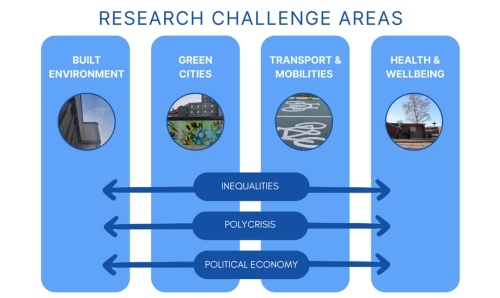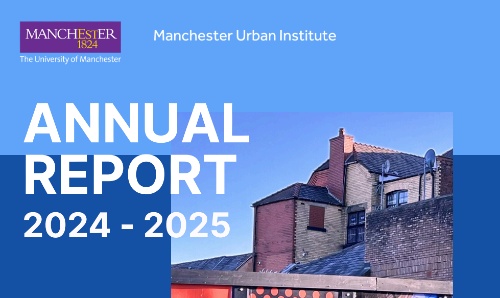
About Manchester Urban Institute
Our vision is to realise more inclusive and just urban environments that are socially sustainable for current and future generations.
The Manchester Urban Institute (MUI) is a global research institute exploring the complexities of urban life in a rapidly changing world. Our mission is to foster deep, interdisciplinary insights into how cities function and to drive positive transformation for people and places creating fair and just cities for everyone.
We combine the strengths of multiple disciplinary perspectives drawn from across The University of Manchester’s three Faculties. We deliver our vision by engaging with a range of global, national, and local stakeholders through cutting-edge methods and participatory action-based approaches.
Our research priorities

MUI addresses global and local challenges through interdisciplinary research across four research challenge areas:
- Built Environment;
- Transport and Mobilities;
- Green Cities;
- Health and Wellbeing.
Three cross-cutting themes drive our research: Inequalities; Polycrisis; and Governance.
We aim to:
- Create integrated understandings of urban systems and their impact on society.
- Provide a hub for urban researchers at all career stages, facilitating collaboration across disciplines.
- Partner with policymakers, businesses, and communities to shape innovative, evidence-based solutions.
- Bridge the gap between research and real-world practice to influence urban policy and development.
- Identify new funding opportunities to support research that enhances community well-being.
Collaboration and impact
We collaborate across disciplines and sectors, co-producing solutions to urban challenges with academic researchers and partners in government, industry, and civil society. This approach directly informs policy and practice, shaping urban strategies at local, regional, national, and global levels.
MUI’s impact is reflected in our interdisciplinary approach to urban challenges, our support for future leaders and researchers at all career stages, and our commitment to sustainable urban development. By translating research into action, we move beyond theoretical knowledge to drive meaningful, real-world change.
Get involved
We welcome engagement with our work. Whether you have questions or comments or are interested in collaboration, MUI provides a platform for transformative dialogue and action. Please email mui@manchester.ac.uk.


